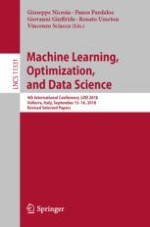2019 | OriginalPaper | Buchkapitel
Improving Clinical Subjects Clustering by Learning and Optimizing Feature Weights
verfasst von : Sergio Consoli, Monique Hendriks, Pieter Vos, Jacek Kustra, Dimitrios Mavroeidis, Ralf Hoffmann
Erschienen in: Machine Learning, Optimization, and Data Science
Aktivieren Sie unsere intelligente Suche, um passende Fachinhalte oder Patente zu finden.
Wählen Sie Textabschnitte aus um mit Künstlicher Intelligenz passenden Patente zu finden. powered by
Markieren Sie Textabschnitte, um KI-gestützt weitere passende Inhalte zu finden. powered by
